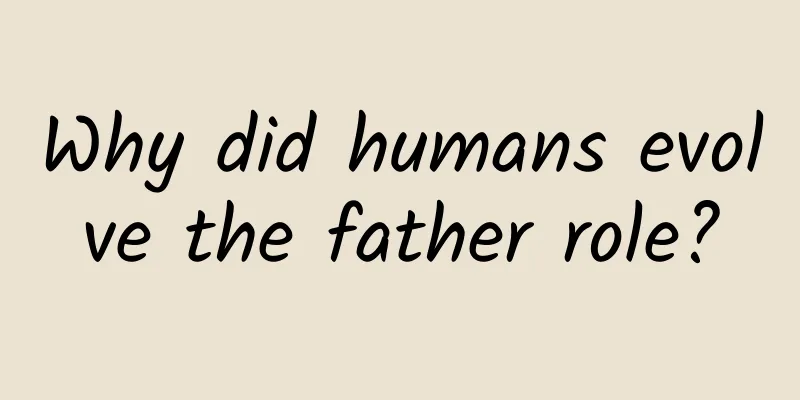Why did humans evolve the father role?

|
Author: Sheng Yuan, Master of Applied Psychology Editor|Chen Tianzhen Fathers are rarely given the spotlight compared to mothers. There is often a preconception that fathers contribute little to their children’s lives. If they display any nurturing behaviors, they are learned rather than natural. Fathers do not connect with their children as deeply as mothers do, and are therefore the “lesser” parent. But is this really the case? Anthropologists have found that in the primate world, fathers mostly only contribute sperm and leave in a hurry after mating. It is very rare for fathers to stay by their side and participate in raising their children. In fact, only 5% of mammal fathers will invest in parenting behavior, and humans are one of them. Given the stingy nature of evolution, fathers' involvement in parenting behavior is very important to us as a species. The continuation of the species must be crucial, or it would not have occurred at all. So what is the key role of human fathers? Why has the father role evolved so rarely in human groups? The answer lies in human evolutionary history. Persistent father involvement in child rearing is extremely rare among primates. A big step forward for civilization, the birth of the "father" of mankind Parents know that human babies are extremely dependent when they are born. As bipeds, humans have narrow birth canals and unusually large heads. In order to reduce the risks during childbirth, humans have evolved a shorter gestation period so that the baby's head can pass through the birth canal safely, but this also leads to a consequence: the baby is born before the brain is fully developed. Curiously, while the time babies spend developing in the womb has been reduced, the minimum period of nursing required after birth has not been extended, but has also been sharply reduced. The weaning age of infants can be as short as three or four months, in stark contrast to the five-year nursing period of chimpanzees. Human mothers can therefore wean their infants as quickly as possible and return to reproductive status, ensuring a steady increase in the population. But children who are weaned early still need to be fed by adults, so the mother is in desperate need of help. The human brain is so complex and consumes so much energy, and the food needed to fuel the brain - meat - is hard to come by. The mother needs to find someone who is as invested in the child's genetics as she is, and raise the offspring together - of course, this person is the father. However, raising children must be beneficial enough to the father's genes to drive him to give up potential mating opportunities with other females and focus on the offspring of only one female. How did nature do it this time? First, without the father's input, the child's survival would be at risk, as would the father's genetic inheritance, so overall it makes sense to stick with it, commit to a woman and family, and secure paternity. Secondly, as time went by, the complexity of human life continued to increase, and young people needed to learn a lot of knowledge: how to cooperate with others when hunting, what skills are there? How to make production tools? What is the surrounding environment and terrain like? These all need to be taught by fathers, so fathers become their children's teachers. In modern society, fathers still perform this teaching role and teach their children various social skills. A father is his child's teacher, imparting life experience to his child. Fatherly love is also instinct Fathers are so crucial to their children and the continuation of the human species that it is no accident that humans evolved the role of fathers. Like mothers, fathers have also been shaped by evolution as biological, psychological, and behavioral caregivers. We often say that maternal love is instinctive, and paternal love is actually instinctive as well. Research has found that new fathers experience similar hormonal and brain changes as mothers. The irreversible reduction in testosterone and changes in oxytocin levels make men more sensitive fathers, attuned to their children’s needs and ready to connect with them — and, crucially, less motivated to seek out a new mate. As testosterone drops, dopamine rewards increase, meaning that every time a dad interacts with his child, he experiences an incredibly wonderful neurochemical reward. Specific areas of the fathers' brain structure also changed. In the evolutionarily older limbic regions of the brain, which are associated with affection, nurturing, and threat detection, both gray and white matter increased. Similarly, in the neocortex, a higher cognitive area of the brain, neurons increased in connectivity and number, which promotes the development of empathy, problem solving, and planning. There is a complex biological, psychological, and behavioral system behind a father's parenting behavior. Father is not a mirror image of mother However, the father did not evolve to be a mirror image of the mother. Evolution hates redundancy, and since there is a mother, evolution will not replicate the same role. The role of the father is not that of a male "mother", but rather a supplement to the mother's role. Differences in the neural structure of the brain clearly reflect the different roles of parents. In a 2012 study, Israeli psychologist Shir Atzil observed the brain activity of fathers and mothers while they watched videos of their children. The results showed that although the areas of the brain related to empathy were highly active in both parents, there were also obvious differences: The mothers' brains were most active in the limbic regions associated with affection and risk detection. The fathers' brains were most active in the neocortex, specifically in areas associated with planning, problem solving and social cognition. Fathers and children have also evolved a unique behavior - intense play. They like to play intensely: Dads throw their children into the air, chase and play with their children, tickle their children, and shout and laugh together. These activities are energetic and exciting, allowing fathers and children to establish a connection quickly. Because games are reciprocal and risky, they also teach children how to give and receive in relationships, and how to judge and deal with risks. Hormonal analysis showed that fathers and their children had the highest oxytocin levels when they were playing together, which was when they were happiest. Mothers and babies were happiest when they were interacting affectionately. Also, attachment to a father is very different from attachment to a mother. Having a strong attachment relationship is like having a secure base from which we can set out to explore the world and from which we can return for emotional support and help. In terms of parent-child attachment, the mother-child attachment relationship is more exclusive and is an inward-looking relationship based on affection and care. In contrast, the father-child attachment relationship also has affection and care, but it is more based on challenges. Fathers will push their children to turn to the outside world more, encourage them to meet peers, build relationships, develop appropriate social behaviors, and help their children build a sense of value and achieve success. Fathers guide their children into the wider outside world. In social stereotypes, fathers are often portrayed as absent or incompetent, struggling to use the washing machine, struggling to take care of children alone, and helpless in the face of their children's emotions. But most fathers are not like this. Countless fathers invest tremendous energy in their children's physical, emotional and intellectual development. Think of the fathers who teach their children to play football or basketball, the fathers who read bedtime stories to their children and scare away night monsters, the fathers who pack their children's school bags and help them with their homework... Nature has evolved the unique role of fathers in humans as key caregivers alongside mothers. Fathers build scaffolding for their children to enter this increasingly complex world and guide them into the wider world. Statistics show that about 80% of men want to be fathers. We should not ignore the existence of fathers, but truly understand fathers as we know mothers, and support them in participating in raising their children. The pictures in the article are from the movie "The Croods". Reference Links [1]https://aeon.co/essays/the-devotion-of-the-human-dad-separates-us-from-other-apes [2]https://knowablemagazine.org/article/living-world/2021/evolution-dad |
<<: Freestyle skiing is not so "free", but Gu Ailing is really cool...
>>: Are there any side effects of always taking painkillers for migraine?
Recommend
Tesla CFO is leaving, former CFO Ahuja to take over
Tesla Chief Financial Officer Jason Wheeler is le...
Why does the Shenzhou spacecraft always choose to launch in the early morning? The right time + the right place + the right people →
At 12:51 on October 30, 2024, the Shenzhou 19 man...
For every extra hour you sit, a slim waist disappears from the world
Friends, are you sitting now? Do you know that &q...
Baidu Baitong promotion brand advertising display location and display method!
Where are the display locations for brand ads? 1....
Yi Zhongtian's Chinese History: The Great Song Dynasty Reform
Yi Zhongtian's Chinese History: The Reform of ...
A new definition of healthy eating? A diet that is good for both you and the planet, but too expensive
How can we eat to keep ourselves healthy while pr...
The World Cup is coming, how can brands take advantage of it to promote their products?
When it comes to sports marketing, you may think ...
How does Tik Tok create a hit? Tik Tok hot marketing skills!
Why can a dancing video of others get tens of mil...
Meizun's "Qianchuan System Course for Tik Tok Live Broadcast Operation" covers live broadcast operation planning, account creation, anchor training, Qianchuan delivery, etc.
Course Contents: Qihao Operation Practice Course....
18 details of Baidu's ocpc delivery
Baidu Big Search ocpc was launched in the second ...
Starting operations from scratch: Keep’s 100-day advancement
There is a reason why Keep is so popular. The ope...
Why do some companies keep saying that they value operations but always fail to do so?
Operations work is very detailed, and some company...
Taiwan earthquake affects the mobile phone and notebook industry chain
According to the China Earthquake Networks Center...
With the lead rate declining, how can the franchise industry save itself after the epidemic?
During the epidemic, some people waited while oth...
"Tiangong Classroom" is about to start. What are the tricks of China's first space class on the space station?
Latest news! China's first space science educ...









